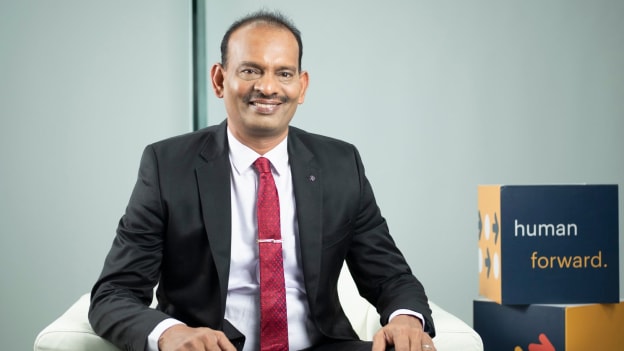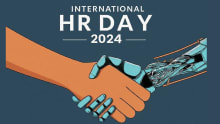Today's workplace is liquid, borderless, digital, and full of opportunities: Randstad India’s Viswanath P.S

Viswanath P.S (or Vishy), MD & CEO, Randstad India, is a business and finance veteran with over 28 years of experience across multiple industries. A pragmatic leader, Vishy's track record reflects his unending commitment to accelerating growth through implementing financial & operational strategies geared towards sustainable growth and profitability.
Vishy joined Randstad India in 2014 as the Head of Shared Services Centre (SSC) and was subsequently elevated to CFO in 2016. He was appointed to his current role in July 2021. At Randstad, he has championed many transformational initiatives - from overhauling the financial structuring & planning process to implementing policies, procedures and systems to enable quick and informed decision-making while enhancing productivity. His vision and rigour have seen him helm the turnarounds of several non-performing business units to profitable ones in an admirable time. In an exclusive conversation with People Matters, Vishy shares his expert insights on the evolving recruitment landscape, how Randstad rethinks what's possible in the world of hiring, the key focus areas of employer branding and more.
Here are some excerpts.
What are some of the emerging trends in the world of recruitment and HR that will redefine how we recruit and retain talent? How has it impacted Randstad India’s positioning in the talent market?
When you look at the world of recruitment, it’s all about how businesses are set up to survive and thrive in a world that is increasingly becoming complex. In order to achieve this, two facets need to be considered: one is the growth trajectory, and the other is managing costs, and it can get quite challenging to decide which one to prioritise more. As a result of the pandemic, the war between Russia and Ukraine, the looming recession, and the accelerated digital transformation, a climate of uncertainty has been created in the business landscape, backed by a widespread scarcity of candidates across sectors. Hiring the right talent, as a result, becomes fundamental to making the right decisions for your organisation in the long term.
From cross-border staffing to the migration of high-impact talent to Tier-2 and Tier-3 cities in India to even hiring temporary CXOs, the talent acquisition landscape is truly changing. In addition, companies today are also led by different CEOs for different business units, indicating a renewed focus on various business operations.
With candidates becoming the king of the talent market, one also finds a proactive engagement from the company, even for entry-level positions. There are online screening tools to assess the skills and behaviours of potential joiners, along with a data-driven approach to recruitment by leveraging analytics to gain deep insights about prospective candidates at every stage of the hiring cycle. Moreover, with work from home being a dominant trend, talent looks for flexible working styles and purpose in their role, resulting in employee experience becoming the top agenda and ensuring the affiliation of the workforce to the company culture becoming urgent. At Randstad India, what we have done by keeping all of these evolving and emerging talent trends in mind is to initiate a job-boss-company fit assessment where we ensure that the talent is aligned with their role, the leadership at various levels of the organisation and of course, the larger purpose and vision of the company.
As leaders seek to innovate their recruitment strategies, how does Randstad India support today’s enterprises in rethinking what’s possible in the world of hiring?
Today, we’re seeing a shift in the outlook of companies that had earlier prioritised full-time employees. Job security indeed is critical, and as a result, permanent jobs accounted for the majority. But with the pressures of managing costs, keeping up with the evolving skill demand and empowering an agile workforce, more companies are looking into what could be the right mix of permanent and temporary employees while also exploring the potential and expertise of the rising gig economy.
We at Randstad never recommend having less than 50% of permanent employees as they are the ones who will be the central force in driving the strategy and achieving the company’s growth targets. While there is no ideal ratio at the end of the day, we still support businesses in designing temporary workforce strategies and increasing permanent employee headcount by thoroughly studying the company’s needs and growth plans.
Today's workplace is liquid, borderless and digital, which opens up many opportunities for companies and the workforce. We work proactively with companies as advisors in strategic workforce planning. Being one of the largest HR services providers, we look at how we can be a valuable working life partner for our clients, supporting both organisations and candidates to realise their full potential throughout their working lives. As a company, we see the possibilities in people no matter who they are, where they come from and their capabilities. We provide businesses with a high-quality, diverse and agile workforce that stays relevant to the ever-evolving world of work.
So far, in 2021, globally, we have helped more than 2 million people find a job that is right for them and have advised more than 235,000 clients on their HR needs. From talent acquisition to total workforce management, we have provided our services and trained almost half a million people. The beauty of Randstad is our tech and touch strategy, where we use data and technology to provide the right advice at the right time with our consultants spread across 5000 locations in 38 markets. Our ambition today is to touch the work lives of 500 million people by 2030.
With more and more digital innovations in the HR space, how does Randstad India empower its leaders to make hiring more human and impactful?
We at Randstad sincerely adhere to the principles regarding labour outlined in the ILO Declaration on Fundamental Principles and Rights to Work and are also committed to the 10 principles of the UN Global Compact. These are foundational to our business principles and are also part of our active dialogue with all stakeholders in the world of work.
At Randstad, we believe in the value of being “human-forward”, and all Randstad leaders are measured for the competencies that are part of this trait. What we look for leaders today is to delight people by building strong client relationships and delivering client-centric solutions; to perform today by securing and developing resources effectively and efficiently; to lead change by managing ambiguity and driving effective decision-making even in the face of uncertainty; and finally, to secure the future and become future-ready by leading the workforce with vision and purpose.
Given that attractive employer branding is synonymous with hiring success, what are the key focus areas that employers today must prioritise to design the right candidate and employee experience?
Randstad has done a lot of work in the domain of employer branding, we do an extensive study every year to gauge the trends and behaviours, and this year has been no different. In our latest report, released more than a month ago, we have found that organisations and candidate expectations have changed as the world of work evolves. There is a greater emphasis on work-life balance as the boundaries between home and work get blurred. Attractive salaries and benefits continue to reign in importance. Still, the benefits need to continuously expand to include healthcare, for instance, or even support for gender re-affirmation surgeries to recognise the needs of the LGBTQIA+ workforce. The reputation of the company is also a critical facet.
Some of the interesting statistics we found in our report are how 9 out of 10 Indian employees consider training and personal career growth as important; 2 out of 3 Indian employees emphasise meaning and purpose; 89% consider upskilling and reskilling programs to be critical offerings; 93% believe that the company needs to support such initiatives; and finally, 85% respondents mentioned that they are likely to stay on in the organisation if such growth and development opportunities are offered. In other words, upskilling and reskilling is critical to keep pace with the evolving skill demand and vital for talent retention.
Employer branding has truly evolved over the years; it’s no longer limited to brand recognition but rather about creating a meaningful connection between what the talent brings to the company and what the company offers them.
What would be some final words of advice on talent acquisition that you would like to share with our HR community?
Given that the candidate is king and talent very scarce, we can no longer be transactional when recruiting people. There needs to be a conscious shift in our mindsets, especially regarding inclusion, so we recognise and understand the biases that can affect the work culture. Today, candidates are looking for places where they can be their authentic selves and add value to the work being done, so it becomes essential to connect the candidate’s purpose to the organisational purpose.
There is also a shift from the culture-fit to the culture-add lens in today’s hiring practices. Culture-fit is important as it empowers organisations to add more muscle to their operations and grow in unexpected ways. This calls for aligning with stakeholders and intelligently assigning roles. These elements are important today for talent acquisition teams to understand and imbibe when it comes to getting the right candidate because, at the end of the day, your talent helps organisations realise their dreams.










